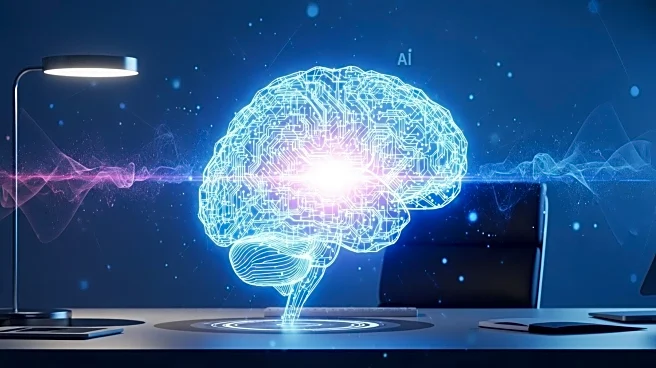What is the story about?
What's Happening?
Grace Leung, a digital growth consultant, is assisting businesses in integrating artificial intelligence (AI) into their operations to enhance employee performance and streamline workflows. Leung emphasizes the importance of starting with foundational AI tools such as ChatGPT, Gemini, and Claud, which can help create automated systems and improve content strategies. Her approach involves teaching clients to use AI for creating templates and workflow systems, thereby simplifying tasks like content creation and data analysis. Leung advises businesses to view AI as a supportive tool rather than a replacement for human roles, highlighting the need for clear guidelines to prevent data privacy issues and the importance of upskilling employees to adapt to AI advancements.
Why It's Important?
The integration of AI into business operations is significant as it can lead to increased efficiency and productivity. By automating routine tasks, companies can focus on more strategic activities, potentially leading to growth and innovation. However, the shift also raises concerns about data privacy and the displacement of entry-level jobs. Businesses that successfully navigate these challenges can gain a competitive edge by leveraging AI to enhance decision-making and operational efficiency. The emphasis on upskilling employees ensures that the workforce remains relevant and capable of working alongside AI technologies, which is crucial in an era of rapid technological advancement.
What's Next?
As businesses continue to adopt AI, there will likely be an increased focus on developing comprehensive AI strategies that address both the opportunities and challenges presented by these technologies. Companies may invest in training programs to equip their employees with the necessary skills to work effectively with AI. Additionally, there may be a push for clearer regulatory guidelines to ensure data privacy and ethical AI usage. Stakeholders, including business leaders and policymakers, will need to collaborate to create an environment where AI can be used responsibly and effectively to drive economic growth.
Beyond the Headlines
The broader implications of AI integration in the workplace include potential shifts in job roles and the nature of work itself. As AI takes over more routine tasks, there may be a greater demand for skills related to critical thinking, creativity, and emotional intelligence. This shift could lead to a reevaluation of educational and training programs to better prepare the workforce for future demands. Moreover, the ethical considerations surrounding AI, such as bias and transparency, will become increasingly important as these technologies become more embedded in business processes.
















